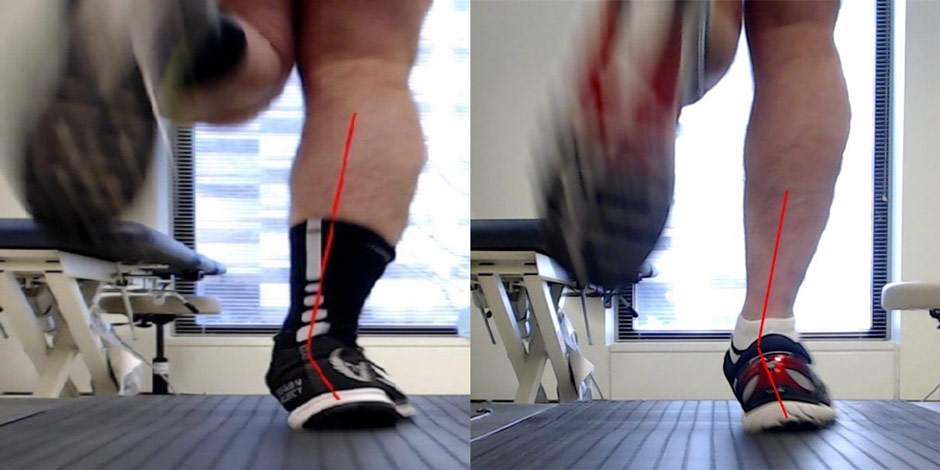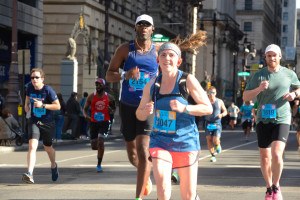How I Discovered Everything Wrong With My Running Form

Two examples of issues with my running form.
I am looking at myself run, and I am mortified.
I’m in the middle of a running assessment at Drexel University’s Parkway Health and Wellness Clinic, which opened in November. Kevin Gard and Robert Maschi are leading me through videos of myself on a treadmill, telling me what’s wrong with my form. I knew I was a rearfoot striker, but I didn’t realize how bad it was. I overpronate, especially on the left side. My right knee turns inward when I strike. My right foot compensates by twisting out on the backstride. When doctors who work for Drexel’s Physical Therapy and Rehabilitation Sciences Department are telling you your running form needs work, you listen. But I could see it myself on the screen, too.
My first memory of running was when I was five. I ran competitively though high school, and have been running recreationally since. For the last few years, I have generally run between 15 and 30 days a month — not too far, not too fast. But I like to run. It’s one of my favorite hobbies. I’ve been relatively injury-free. I used to turn on my ankles, but in recent years the problem alleviated. I credited switching to different sneakers, Nike Zoom Elite 6s. I figured my form was at least OK.
Instead, based on the results of my running mechanics exam, I now realize I look ridiculous. Earlier, Gard and Maschi had taken me through a battery of flexibility and strength tests, and I bombed some of them, too. My hip abductors and extensors are weak. My hamstrings are tight — I knew this one — but, surprisingly, that wasn’t deemed much of a problem. My core strength is weak, despite years of working on it.
What’s great is Maschi and Gard are helping me fix my running form. Both are Drexel professors at the Department of Physical Therapy and Rehabilitation Sciences. Gard is vice chair of the department and director of the Professional Doctor of Physical Therapy program. Maschi is an assistant clinical professor whose “research interests focus on the assessment of running biomechanics and their relationship to overuse injury as well as the role of the pelvic girdle and core function in musculoskeletal injury.” Maschi has run three marathons; Gard has done seven. They’re fit. I bet their running form is perfect. They are totally qualified to tell me how to fix my running form.
Gard says that, in his time treating patients, he’s had plenty of runners and athletes. A while back he began looking at people’s running form to try to assess where injuries were coming from. “It sort of evolved from there,” he says. “There have to be a lot of runners out there that just want to improve. And so we could do the same assessments on them and perhaps improve their performance and prevent injury down the road.”
A few days after my posture and strength were measured with simple exercises and my running form was filmed, I got a report from Gard. It detailed my strengths and weaknesses. The recommendations: a series of exercises to fix weak spots and a recommendation for new sneakers. I had grown attached to my Nike Elite 6s, but I realized should go back to a more stable shoe. I went to Philadelphia Runner and walked out with Brooks Transcend 2s.
A week after my assessment, I went back to Gard and ran again on the treadmill in my new kicks.

Much better! Also, I wasn’t wearing basketball socks the second time.
Gard also led me through a battery of exercises that I can later do at home. On another treadmill run, he worked with me on fixing my form and shortening my stride. We watched more videos. I didn’t cringe as much this time. We’ll see how it goes.
If you want to take a running assessment, call 215-553-7012 or email ptappts@drexel.edu. They’re done at the Drexel College of Medicine building downtown at 1601 Cherry Street. The assessment costs $200, with another $50 for the optional followup appointment. You’ll be given a multipage assessment of your form and how to improve it.
Like what you’re reading? Stay in touch with Be Well Philly—here’s how:
- Like Be Well Philly on Facebook
- Follow Be Well Philly on Twitter
- Follow Be Well Philly on Pinterest
- Get the Be Well Philly Newsletter


